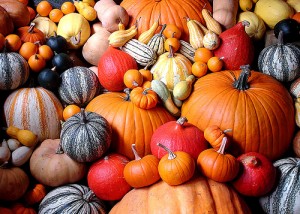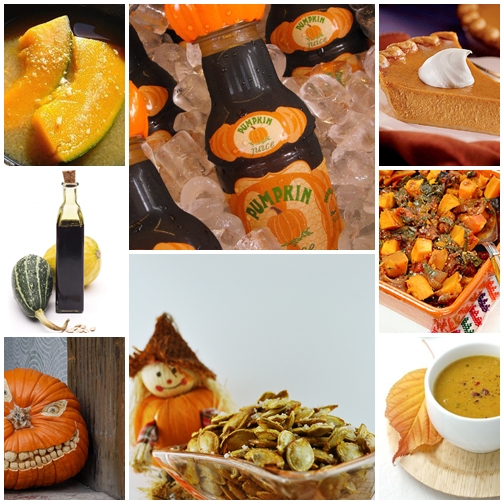Pumpkin Juice
The Pumpkin
The pumpkin belongs to the family Cucurbitaceae which includes gourds like cucumbers, squash, luffas, and melons. The term pumpkin, originated from a Greek word which means “large melon.”
Pumpkins vary in shape, size, and even color, although you would think all pumpkins are orange when you imagine its Halloween-crafted counterparts. But some are dark or pale green, white, red and gray. Their common orange color, though, is derived from the same-colored pigments that are abundant in them. Its rind is smooth and lightly-ribbed resembling that of a squash.
Pumpkins are very popular in the US because of their ornamental and commercial value during Halloween. But this is not all that pumpkins are good for. Pumpkins are also filled with nutrients and there are even pumpkin weigh-off competitions during festivals.
Are Pumpkins Fruit Or Vegetables?
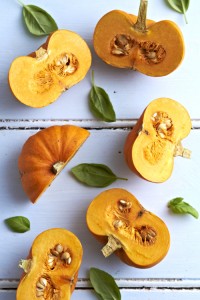 There has been some confusion as to what this orange gourd-like squash is—is it a fruit or a vegetable? Botanically speaking, since it has seeds, the pumpkin is indeed a FRUIT. While others would still argue beyond this botanical fact that it is a vegetable because it is neither sweet nor fleshy, basing on the culinary definition of fruit or vegetable.
There has been some confusion as to what this orange gourd-like squash is—is it a fruit or a vegetable? Botanically speaking, since it has seeds, the pumpkin is indeed a FRUIT. While others would still argue beyond this botanical fact that it is a vegetable because it is neither sweet nor fleshy, basing on the culinary definition of fruit or vegetable.
To avoid further argument, the pumpkin is botanically a fruit but is considered a vegetable in the culinary world.
There Are Many Uses For Pumpkins
- As Halloween accessory
- For soups and purees
- Mashed pumpkins
- For bread, pies and desserts
- As ingredient for dishes
- For juices and beverages
- Roasted pumpkin seeds
- Pumpkin seed oil as edible oil, salad dressing, or for wound treatment
Health Benefits of Pumpkins
Pumpkins are not just for carving, they are also a healthy addition to the diet. They are even praised as one of the world’s SUPERFOODs. Here are just some of the benefits that pumpkins can have for your health.
Anti-diabetic
Pumpkins extract contains chemical compounds that increase insulin levels in the bloodstream. It is therefore good for people who are prone to type-1 diabetes and those who already have it.
A study done on non-obese type 2 diabetic rats show that pumpkin juice contains relatively abundant amounts of compound (trigonelline and nicotinic acid) that improves glucose tolerance. Other studies also show that supplementing flax and pumpkin seed mixture to the diet of adult rats may prevent diabetic complications.
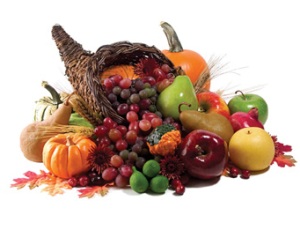 Antioxidants
Antioxidants
This backyard fruit is very low in calories, high in fiber and incredibly rich in vital antioxidants and vitamins. It is a rich source of Vitamin A, flavonoid poly-phenolic antioxidants like leutin and xanthins. Just like carrot, the pumpkin is super rich in beta carotene, which prevent certain kinds of cancer and may reverse skin damage caused by the sun. Aside from beta-carotene, alpha-carotene is also present in pumpkins, which may aid in slowing the aging process. Both beta carotene and alpha carotene convert to Vitamin A in our body.
It is loaded with both potassium and zinc. Potassium lowers the risk for hypertension, balances body fluid levels, promotes strong and healthy bones, is vital for energy production, and helps control blood pressure. Zinc boosts the immune system and aids in bone density.
 Anti-carcinogenic
Anti-carcinogenic
Pumpkin seeds may be responsible for shrinking the prostate, because they contain protective compounds called phytosterols. Adding about one ounce of shelled pumpkin seeds to your diet 3 times a week may reduce the risk for BPH or Benign Prostate Hyperplasia/ enlarged prostate.
The alpha-carotene in pumpkin may also prevent tumor growth.
Anti-inflammatory
This amazing fruit also has anti-inflammatory benefits for arthritis, minus the usual side-effects of anti-inflammatory drugs. To relieve pain and reduce inflammation caused by arthritis, just add roasted pumpkin seeds to your daily diet.
Other health benefits
- Stimulates appetite
- Serves as effective anti-depressant and relieves nerve exhaustion
- Prevents obesity and burns fat
- Helps dissolve gallstones and prevent kidney stone formation
- Provides a calming effect on the brain for hyperactive kids
- Serves as digestive system regulator, soothes the stomach, and treats ulcers
Nutritional Value per 100 g
- Carbohydrates: 6.5 g
- Sugars: 1.36 g
- Dietary Fiber: 0.5 g
- Fat: 0.1 g
- Protein: 1 g
- Vitamin A: 369 μg
- Beta-carotene: 3100 μg
- Thiamine (Vit. B1): 0.05 mg
- Riboflavin (Vit. B2): 0.110 mg
- Niacin (Vit. B3): 0.6 mg
- Pantothenic acid (B5): 0.298 mg
- Vitamin B6: 0.061 mg
- Folate (vit. B9): 16 μg
- Vitamin C: 9 mg
- Vitamin E: 1.06 mg
- Calcium: 21 mg
- Iron: 0.8 mg
- Magnesium: 12 mg
- Phosphorus: 44 mg
- Potassium: 340 mg
- Sodium: 1 mg
- Zinc: 0.32 mg
Recipe for Pumpkin Juice ala Harry Potter
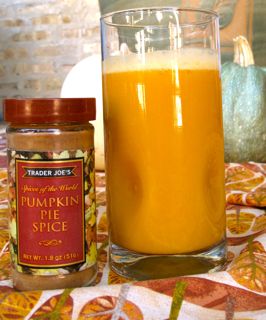
Ever wonder why this refreshing juice was heralded as the Hogwart’s School of Witchcraft & Wizardry’s favorite juice? Indeed, there must be some magic in it if you scroll back to its amazing benefits. Below is a delicious pumpkin treat, that would definitely suit your Halloween appetite, giving health freebies to your body at the same time.
Ingredients:
- 2 cups of pumpkin (chopped in chunks)
- 2 cups of apple juice
- ½ cup of pineapple juice
- 1 teaspoon of honey
- Cinnamon, Ginger, Nutmeg and/or Allspice (all ground, to taste)
Instructions:
- Pour the pumpkin chunks into a juicer or squeeze through a cheesecloth
- Pour the pumpkin juice into a blender.
- Add the apple juice and pineapple juice, and blend.
- Add 1 tsp of honey to the juices and blend thoroughly. Add some later, depending on your taste preference.
- Add your spices to taste.
- Chill your pumpkin juice or serve with ice. Enjoy!
More Articles On Pumpkins And Pumpkin Juice
The Best Pumpkins for Pumpkin Juice and How to Choose Them
The best pumpkins for juicing are easy to identify. They’re …Pumpkin Juice Side Effects: Can You Drink Too Much Pumpkin Juice?
There is no comprehensive scientific literature that establishes a toxic …Pumpkin Nutrition Facts
Pumpkin Nutrition Facts Betaine 0 mg Calcium 21 mg Calories …Health Benefits Of Pumpkin Juice: Pumpkins Aren’t Just Good for Halloween
When I think of pumpkins, Halloween is the first thing …
